NEW YORK — Ask Rabbi Meir Soloveichik about his congregation, and he'll tell you about 23, 17th-century Jews who can thank pirates and the French for landing in New York. Ask him about religious freedom, and he'll tell you about the Revolutionary War.
Historical references, as well as references to The Simpsons, Monty Python and the scriptures, come easily to the rabbi, who rarely comments on the world today without mentioning the past.
"We're only in 1730," he said, already 20 minutes into answering a question about his congregation's beautiful synagogue on the western border of Central Park.
Rabbi Soloveichik, 40, stands out because of his sense of history. But the decision to award him the 2018 Canterbury Medal, an honor given to someone who advances the cause of conscience rights, has more to do with his future potential, according to Bill Mumma, CEO and board chairman of the Becket Fund for Religious Liberty, which sponsors the annual award.
"He's young and he's in a leadership role," Mumma said. "We can see him playing a stronger and stronger role outside of the Jewish community in the fight for religious liberty."
Already, Rabbi Soloveichik has testified before Congress on behalf of religious employers opposed to providing contraceptive coverage for their employees. He's spoken with the Trump administration about their policies on Israel. He offered the opening prayer at the 2012 Republican National Convention.
In spite of this impressive resume, many colleagues and friends say his best work is yet to come.
Rabbi Soloveichik has little interest in discussing why his star is on the rise. When asked about his Canterbury Medal, he focuses on the work of Becket, rather than himself.
"It is one of the great honors of my life to be affiliated with what Becket does," he said. Past Canterbury medalists include now-President Dallin H. Oaks, first counselor in the First Presidency of The Church of Jesus Christ of Latter-day Saints, Mitt and Ann Romney, and Robert George, a legal scholar whom the rabbi describes as a mentor.
Rabbi Soloveichik, who comes from the most prominent family in modern Orthodox Judaism, grew up in Chicago and attended Yeshiva University in New York. He holds a Ph.D from Princeton University and has also taken several classes at Yale Divinity School, seeking to learn more about Christianity.

The rabbi has led Congregation Shearith Israel, the oldest Jewish congregation in North America, for the past five years. He also directs the Zahava and Moshael Straus Center for Torah and Western Thought at Yeshiva University, where he helps Jews connect their faith to other sources of wisdom, like philosophy and art. He and his wife, Layaliza, have six kids.
His typical week includes a mix of formal functions, congregational gatherings, worship services and lots of caffeine.
"Life is crazy. It's frenzied. But the blessing is that I love everything I do," he said.
The Deseret News met with Rabbi Soloveichik this week to discuss his busy life, the recent U.S. embassy move to Jerusalem and his approach to religious freedom. This interview has been edited for length and clarity.
Deseret News: Why are you passionate about religious freedom?
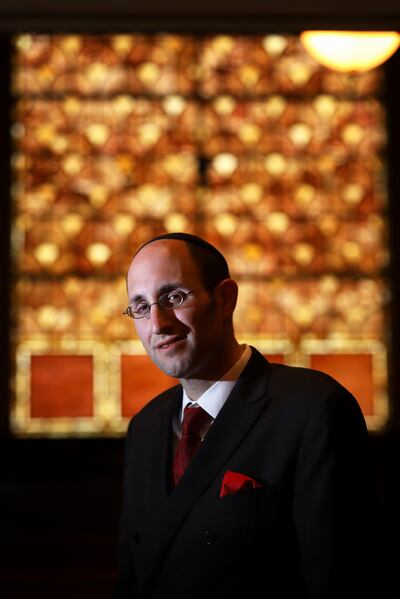
Rabbi Meir Soloveichik: I feel that the Jewish story in America is a unique tale of the benefits of religious liberty.
And I believe — and this is the important part — that because Jews have been so blessed by religious liberty in America, we have an obligation as Jews and as Americans to fight for it on behalf of others and to ensure the perpetuation of the American idea of religious liberty.
There's a Jewish expression, a phrase, called "hakarot hatov." It means the recognition of the good. It means that when somebody does a good thing for you, you have to feel gratitude and show gratitude.
Jews show hakarot hatov to America by fighting for and preserving what makes America unique. Religious liberty is at the core of the American worldview.
To the extent that I've taken positions and fought for things, they weren't always things that impacted the Jewish community directly. I believe we have to fight for the religious liberty of everyone. That's why I love Becket: that's what they do.
DN: Is it getting harder to fight for and preserve religious freedom?
MS: In the past decade, it's become a central issue of political debate. I certainly wish that wasn't so. I wish everyone embraced religious liberty.
In the early 1990s, the Religious Freedom Restoration Act was passed almost unanimously. That would not happen today, unfortunately. Religious liberty is caught up in public debate and disagreement.
DN: What caused this shift?
MS: We've become a more divided country around a lot of things related to faith. For example, religion's place in the public square has been the subject of massive debate.
Polls show the divisions between traditionally religious and secular Americans are growing. One of the ways that's reflected is in the area of religious liberty.

DN: Becket's most recent Supreme Court cases illustrate the various concerns that fit under the broad category of religious freedom. For example, in Sebelius v. Hobby Lobby Stores Inc., Becket argued on behalf of corporation leaders who, for religious reasons, did not want to pay for contraception coverage for their employees.
Are all religious freedom fights created equal?
MS: What I love about Becket is precisely that they fight for the religious freedom of all Americans. They fight for the rights of the Little Sisters of the Poor, of the Muslim prisoner not to have to shave his beard and of a Sikh who wants to wear his turban while serving in the U.S. Armed Forces. These cases show the true mosaic of faith that is America.
Some cases are more controversial and some are less controversial. I don't see the underlying issues as being different. They become different for some when they get connected to the culture wars.
But for Becket, these are all issues of religious freedom. We need to believe and fight for religious freedom for everyone.
DN: Are you comfortable getting caught up in the more controversial cases?
MS: I don't look for controversy. I do take stands when I think it's important to enunciate certain principles.
At the times when I've done that, I'm proud of it. I'm proud because I see it as a form of Jewish gratitude to America. I'm proud because I feel that I'm giving to America what America has given to us.
At times, you get caught in the maelstrom. You can get swept up. And it's hard.
I testified in Congress regarding the (Affordable Care Act's contraception) mandate, which I thought was a threat to religious liberty because of how it was being applied at the time.
But the mandate was caught up in the election, even if, for me, it wasn't an issue relating to politics. It was an issue relating to religious liberty.
Unfortunately, religious liberty has become a political issue. I would prefer it not be. I think Becket would also prefer it not be. We'd prefer that religious liberty be a source of unity, not division.
DN: Like religious freedom battles in general, the status of Israel and control of Jerusalem are growing more contentious. Are you surprised by the tension and violence surrounding the U.S. embassy's move to Jerusalem?
MS: I’m not surprised by it because criticisms of Israel have been going on for a long time. And violence in the Middle East is something that's been going on for a long time.
But I still celebrate this moment. This is something that should not be, in my view, linked to what one thinks about domestic policy and about politics.
In my view, when the president of the United States recognizes the Jewish right to Jerusalem, that should be a source of rejoicing and of gratitude for all Jews.
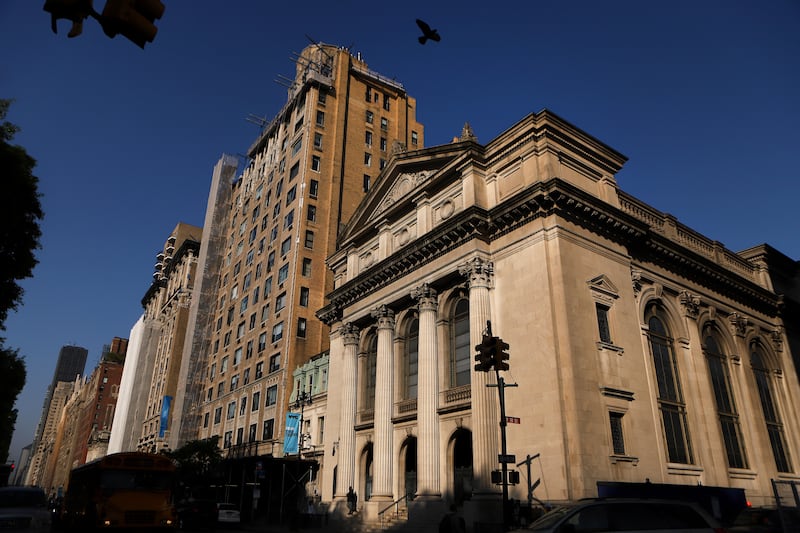
DN: In general, are you pleased with President Donald Trump and Vice President Mike Pence's approach to religious freedom?
MS: Absolutely. I was certainly delighted to hear of their decision to alter the contraception mandate to obviate religious liberty concerns.
I've been delighted as well with many of the vice president's speeches. I attended his speech at the Knesset (in January) where he wasn't just speaking for himself. He was speaking for tens of millions of Christians in American who feel the same way about Israel as he does.
That's remarkable. This age in which we live is the first time in Jewish history where there are tens of millions of non-Jews who care passionately about the wellbeing of the state of Israel. I see that in the evangelical community, of which the vice president is a representative example.
I've also journeyed to Israel with LDS Church leadership and seen that with them.
To me, that's incredibly emotional.

DN: But anti-Semitism is also on the rise in the age in which we live. How does this trend affect your community?
MS: For anti-Semitism in America, I don’t know if it’s actually rising. I do know that social media allows for the expression of hate in a variety of new ways. It allows some of the most hateful things to be said with the cloak of anonymity.
In Europe, there is no question that anti-Semitism is a terrible problem. And my community and the entire Jewish community in America looks with great dismay at what’s happening. (Jews in Europe) face real religious liberty issues.
To some extent, threats to religious liberty in America recently have affected members of other faiths more than Jews. But I've spoken up because it's important to me. If we allow one faith to be threatened, that will come to threaten us, as well.
DN: One of the reasons Becket chose you as this year's Canterbury medalist is your commitment to interfaith cooperation. As you noted, you've met with LDS leaders and spoken up to defend other faiths. Why do interfaith friendships matter to you?
MS: The form of interfaith engagement that I practice, which is guided by the practices of my great uncle, Joseph Soloveitchik (whose last name is spelled differently) before me, is one that recognizes that all faiths have matters of great significance about which they disagree.
We don't relativize or do away with those differences. At the same time, we recognize that there are profound things that we share.
We live in a society in which many people reject the idea of a capital-T "Truth." So our shared belief that there's truth out there to be sought bonds us together. We can learn from each other.

DN: When you talk about why you do the work that you do, you often say "as a Jew and as an American." Why do you use that phrasing?
MS: The heart of the American idea is a recognition that, for believers, our faith is the most important thing to us. And that to ask a person of faith to shed their religious identity as a price for participating (in the public square) would be to ask them to amputate the most central part of their souls.
So for a Jew to say that his Judaism or for a Catholic to say that his Catholicism or for a Mormon to say that his Mormonism is the most central part of himself is actually a very American thing to say. The American approach to religious freedom recognizes how central faith is to believers.
So when I say '"as a Jew and as an American," I mean first that my Jewishness and my adherence to Judaism is the most central aspect of my identity. But that's not in tension with my identity as an American.
I'm also referring to the story of Jews in America, which inspires my passion for religious liberty.
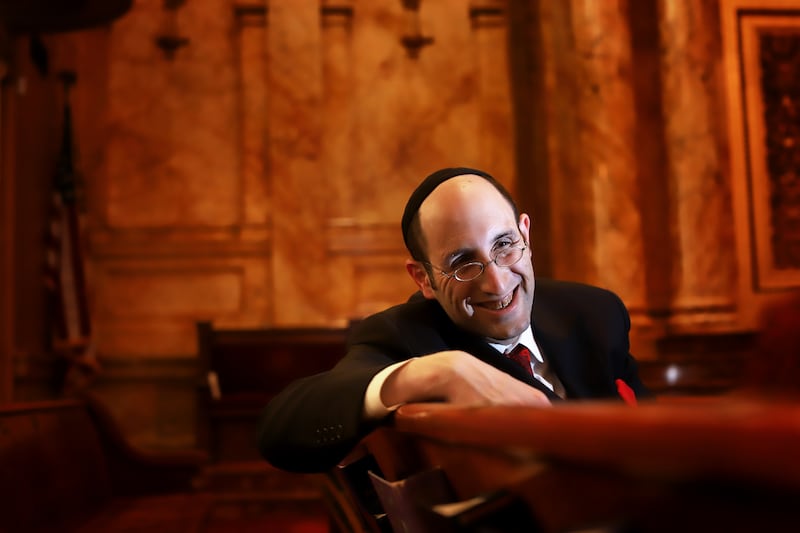
DN: What are you doing to make religious freedom a source of unity again?
MS: I don’t know whether religious freedom will become less of a political issue. I would love for it to become less of one, but I don’t know if that’s going to happen anytime soon.
My role is not a political role. My role is to defend religious liberty and speak up for religious liberty. I don't see what I do in this respect as political.
For me, religious liberty is an American issue. It's not a political issue.
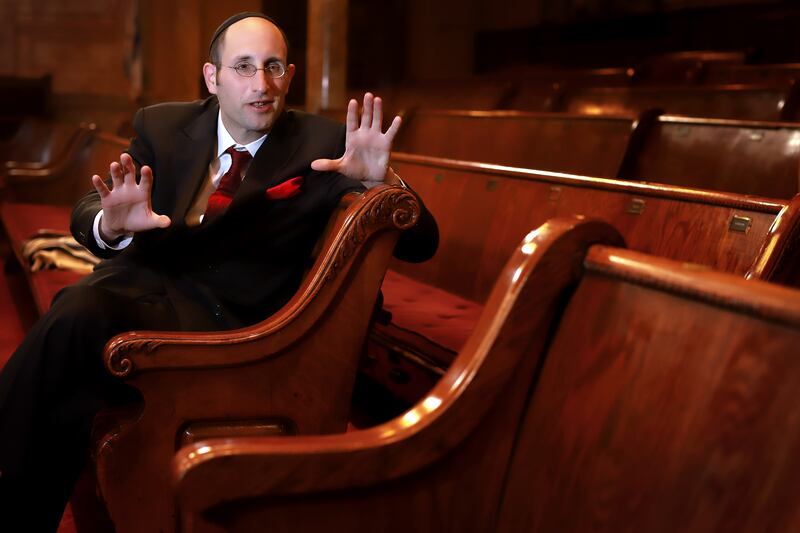
DN: Speaking of your role, you wear a lot of different hats. You're a congregational leader, a teacher, a father, a religious freedom advocate and, sometimes, a guest at the White House. How do you manage to do all of that?
MS: It's a real blessing to do things that you love, whether that’s teaching, communal work, building an academic center or engaging in the public square for causes that you believe in.
If you love the work, and it corresponds to your talents, that’s a great blessing.
One of my favorite movies is "Chariots of Fire," and one of my favorite lines from it is from the Christian runner, who is training for the Olympics. He's a missionary.
His sister asks why he's training for the Olympics. She thinks it's a waste of time and a distraction from his important missionary work.
He says he believes God made him to serve a purpose through his missionary work, but that he also made him fast. He says that when he runs, he feels God's pleasure. He's not using his talents for self-glorification.
God did not make me fast. I don't have athletic ability.
But what I love about the quote is that it says the greatest blessing is to feel that you're using the talents God has given you. That's the feeling of fulfillment you get in a frenzied life.

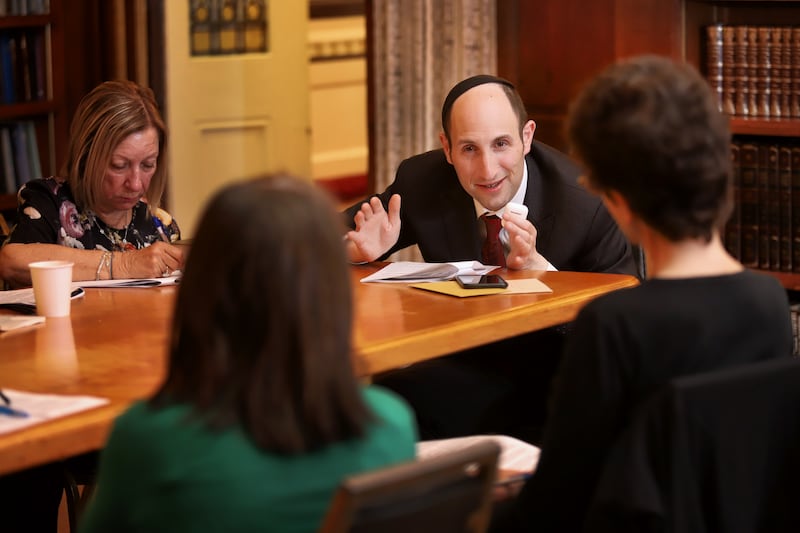
 alt=Kelsey Dallas
alt=Kelsey Dallas